QuestionQUESTION: I have hand raised every thing from doves to b&g macaws to conures to starlings so I am not new to feeding. I am getting a little sun conure in a week or so that I will need to hand feed but it has been a few years for me and I would like it if you could tell me what brand of formula you prefer and what ratio (19/8). I have always fed pretty bird brand. Also what brand of adult pellet food would you recommend along with the fruit and veggies I will give him. I just got on a site named lakesbirdfood.com. Please tell me what you think. Thank you, Heidi
ANSWER: Hi, Heidi,
Are you new to handfeeding? How old is this little Sun Conure you are getting?
I prefer using Kaytee Exact handfeeding formula. I've used other brands, but prefer Exact. My avian vet recommend Exact, too. My babies being fed this brand are always healthy and grow very well. I also like how this product mixes. Some brands don't seem to mix well when hot water is added. I've also found I don't have babies with crop problems with Exact as I've had with other brands. I don't know what you mean by ratio 19/8. I use Kaytee right from the bag, mixing with hot water, and I usually add human strained baby food to the mix. The baby food provides extra vitamins/minerals for hatchlings.
I prefer and my avian vet recommends Zupreem pelleted food. My larger birds like the fruit blend for parrots/conures.
I will have to check into the Lakes bird food website. However, when I find food I like and my parrots like and do well on, I do not change.
Chrys
---------- FOLLOW-UP ----------
QUESTION: please let me know what you find out about the lakes bird food when you get a chance. They will send free samples. thank you, heidi
ANSWER: Hi again, Heidi,
When I get a chance......
Look at the ingredients listing for this food and see what the food is made of. Also look at the vitamin/mineral content, how much fat is in the food, etc. If it is seed....seed should be used as an occasional treat and/or reward for good behavior, not a primary diet. All seed diet is a poor diet for a bird. Seed is high in fat and low in nutritional value. It tastes good, so birds like it, just like kids love candy!
Chrys
---------- FOLLOW-UP ----------
QUESTION: here is what they say but I really think you should look at the site youself.How do I know what's in Lake's Ultimate Avian Diets?
In compliance with Food and Drug Administration (FDA) and AAFCO directives, all ingredients used in each Lake's diet, are listed in descending order of predominance by weight. In other words, the ingredient with the highest inclusion rate in the bird food formula is first, the second listed next, etc. All the ingredients used are "dry" so after processing, the bird food still contains proportional amounts, as shown on the ingredient listing. With Lake's Ultimate Avian Diets, what you see is what your bird gets. We trust you to make an informed choice. Because when your bird's health is at stake, Lake's is your only choice.
Lake's Manufacturing Process
We start by grinding our corn and wheat, then we slowly mix in all our other dry ingredients. Its nutritionally best, to derive ingredients from their whole source, when possible.
Then this dry granular mixture is sent to the pelleting machine where its densely compressed at about 180 degrees. Remember, if an ingredient is not contaminated to begin with, there should be no reason to have to pasteurize a product at 300+ degrees, which can destroy valuable nutrients and enzymes.
After the pellet is made, it is then packaged and shipped, unless we're making our hand-rearing formula. Being a parent bird regurgitates its food to the young, we wanted a diet that would be the "same" for both, reducing the stress of diet change. After we manufacture our 17% protein pelleted diet, we then grind up the pellets in a huge hammer mill, to a consistency slightly coarser than flour. The pellet is excellent for the adults, even when they feed their young, but to coarse to fit through most feeding syringes. We do this extra grind, to enable us to start with whole grains. A coffee grinder will also work, to make Lake's hand-rearing using the Special Needs pellets.
Because all our ingredients are combined before its pelleted, there is no need to add anything to the outside of the morsel. In the expanded processes, a process where cooked ingredients are extruded/expanded with air (like hard sponges), additional vitamins are sprayed on the outside to compensate for loss of nutrients at high manufacturing temperatures. When the Lake's pellet is made its done and packaged.
What is the advantage of using a manufactured diet?
There are many advantages in using a high quality manufactured diet. Some of these advantages include:
In a traditional seed diet, a bird can pick and choose what they want. When using a seed diet, a bird will tend to choose only the seeds it likes. The problem with this, is that a bird does not always choose what is best for them. Furthermore, their is not one perfect food source, if a bird consumes only one or two kinds of seeds they will not receive all the nutrients they need. Manufactured diets eliminate the guesswork by providing birds a balanced diet in every bite.
In addition to this, manufactured diets are 100% edible. They provide the only sure method of supplying vitamins and minerals in quantities considered to be proper for caged birds.
Breeders will agree, that feeding a high quality bird diet produces a greater number of fertile eggs. From these eggs a larger percentage of birds will grow to maturity and live a healthier life.
Although there are many more advantages to a pelleted diet, the one that most bird owners like, is that they are convenient, and cause less mess than a seed diet.
AnswerHi again, Heidi,
Normally, the food producer puts the ingredients of the food on their website, along with other nutritional data. If not, you can call them and ask. If you are going to keep birds, you'll need to learn what is nutritional and what isn't.
I looked at the Lakes Website last night. It appears to be a good pelleted food, but I've never used it and don't know anyone else that has, so I can't attest to how good it is, whether your birds will eat it or not, etc. It's one thing to look at a food, read its ingredients, nutritional values, etc., but will the birds eat it. If they won't, what good is the food. If they do, how does this food affect their overall health over a period of time? I have learned after 18 years of keeping parrots that certain foods are better than others. I haven't tried all the foods available with my birds, but I'm not going to change something that works. Of course, the information you read on the website is all favorable...they want you to buy their food! What you really need to do is find people who have used it and ask them what it did for their birds over a period of time.
You may want to ask for some samples, read the labels, etc., and see if your birds will eat it. Birds can be picky! Most of my birds won't eat the tan/brown colored pelleted foods, so I buy the colorful pellets. Compare this food to others, such as Zupreem. Ask your avian veterinarian what s/he recommends and/or take the food into your vet and ask.
Chrys

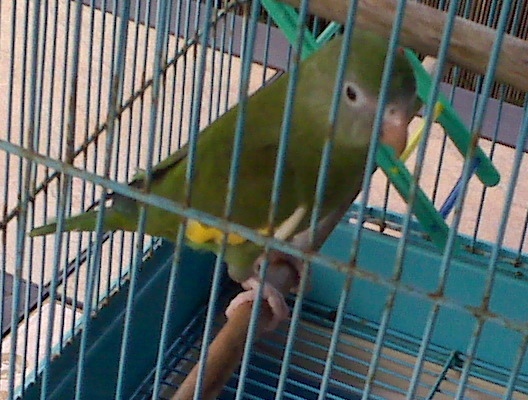 What type of parrot is this?
Question
Friendly bird
A week ago ths small parrot flew
What type of parrot is this?
Question
Friendly bird
A week ago ths small parrot flew
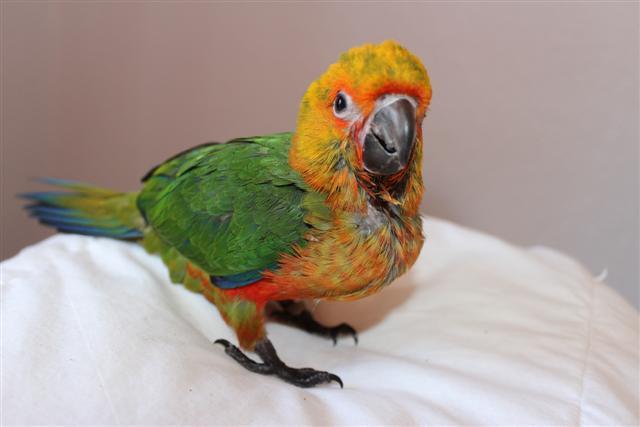 Jenday Conure Weaning?
Question
Castor the Conure
Hi
I have a 9 week o
Jenday Conure Weaning?
Question
Castor the Conure
Hi
I have a 9 week o
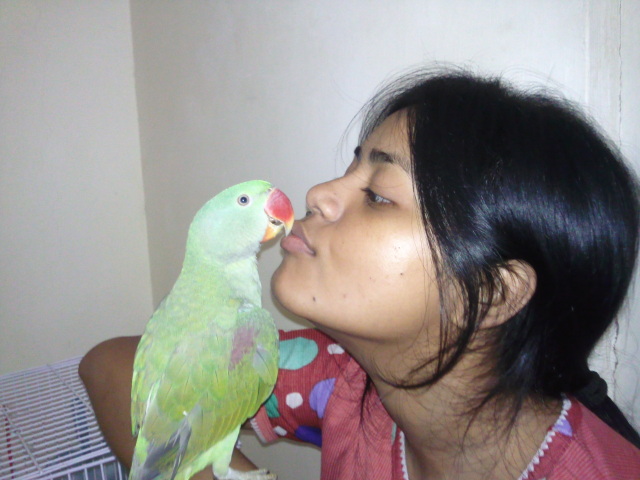 can i give my parrot chole(chana) called in hindi
Question
my little chaddi alexa
dear sir,
can give chan
can i give my parrot chole(chana) called in hindi
Question
my little chaddi alexa
dear sir,
can give chan
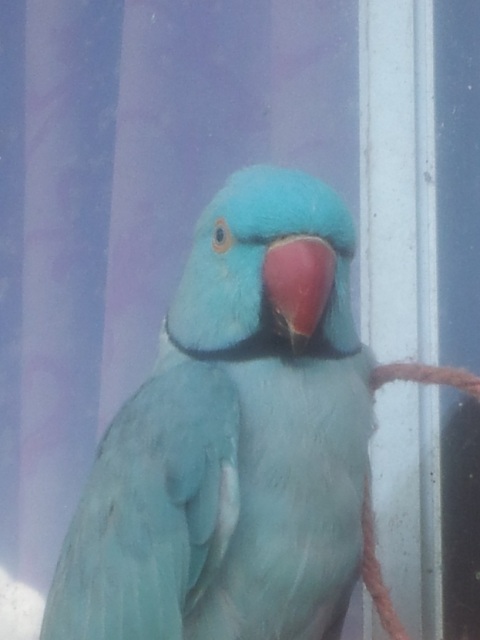 RE: Indian Ringneck probems
Question
Indy our Ringneck
Thank you for your he
RE: Indian Ringneck probems
Question
Indy our Ringneck
Thank you for your he
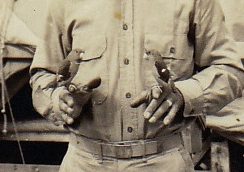 ID Birds
Question
Panama Birds
My uncle served in Panama in 1941
ID Birds
Question
Panama Birds
My uncle served in Panama in 1941